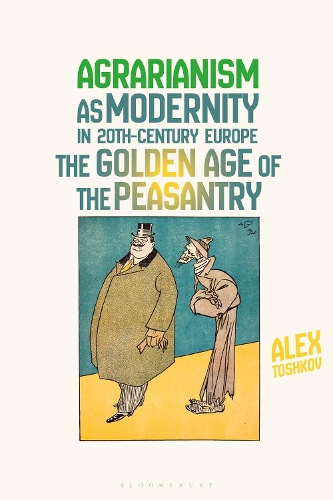
Agrarianism as Modernity in 20th-Century Europe: The Golden Age of the Peasantry
(Paperback)
Publishing Details
Agrarianism as Modernity in 20th-Century Europe: The Golden Age of the Peasantry
By (Author) Dr Alex Toshkov
Bloomsbury Publishing PLC
Bloomsbury Academic
25th March 2021
United Kingdom
Classifications
Tertiary Education
Non Fiction
Social and cultural history
306.3640940904
Physical Properties
Paperback
240
Width 154mm, Height 232mm, Spine 16mm
380g
Description
Whilst Soviet communism and its relationship with modernity has been widely studied to date, the agrarian experiment in Eastern Europe has been relegated to the margins of historical analysis. In this comparative study, Alex Toshkov uncovers the history of agrarianism after the First World War and explores its place as an alternative modernity to liberal democracy and capitalism. Drawing on a wealth of archival material, this book explores the transnational connections between the paradigmatic cases of Bulgaria, Yugoslavia and Czechoslovakia, as well as the International Agrarian Bureau in Prague, teasing out contradictions, hidden records and silenced interpretations of agrarianism. In addition, it uses a microhistorical approach to present an innovative theoretical framework which adds to our understanding of nationalism, political corruption, and alterity and the subaltern. This fascinating study restores interwar agrarianism to its rightful place as one of the most original and significant political currents in 20th-century Europe.
Reviews
No doubt, Agrarianism as Modernity will provoke debates beyond the circle of specialists in the agrarian history of the interwar period. * Revue d'Histoire Moderne & Contemporaine (Bloomsbury Translation) *
Agrarianism constituted one of the best alternatives for democratic, peaceful and equitable development in early 20th-century Europe. Alex Toshkovs fresh account provides a compelling analysis of peasant parties presenting them as an opportunity crushed by hostile forces. His unique, comparative approach makes the book a must-read for anyone interested in the modern political history of the region. * Ulf Brunnbauer, Leibniz Institute for East and Southeast European Studies, University of Regensburg, Germany *
Alex Toshkov restores to history the Agrarian movements of Eastern Europe, deftly and expertly showing how their radical and forward-looking vision of modernity reshaped postwar politics and forced their opponents on the right and left to respond to them. This volume profoundly reshapes our understanding of the potential that Agrarian politics had in the aftermath of World War One and how the reaction against Agrarianism lies at the heart of the story of the interwar period. * Daniel Brett, Teaching Fellow in Social and Political Science, University College London, UK *
Author Bio
Alex Toshkov is Sessional Lecturer at the Centre for European, Russian, and Eurasian Studies at the University of Toronto, Canada.
